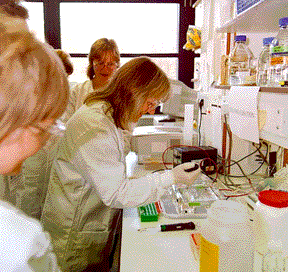

This Master Class focused upon biotechnology and food. We always try to have leading scientists in the field at our Master Classes and this one was no exception. This time we had:
• Prof. Nick Day, who works for the Medical Research Council Biostatistics Unit. He addresed the rationale for the EPIC study (a very large study into the relationships between diet and disease), what it hopes to achieve, how it was set up and issues of European collaboration.
• Dr. Richard Mithen, from the John Innes Centre, gave examples
of genetic modification to ''minor' components of food, such as
vitamins, minerals and flavour compounds and how these might improve
their nutritional value. He then described a programme which is
seeking to enhance anticarcinogenic activity.
• Dr. Wendy Harwood, from the John Innes Centre, compared genetic modification of plants by traditional methods with modern biotechnological techniques. She gave examples of how staple cereal crops may be genetically modified for different conditions, e.g. modifying rice that needs fewer agrochemicals.
• Dr. Mike Gasson advises the UK Government on the safety of food applications of gene technology and has been involved in gene technology research for over twenty years. He spoke about the new technology in food, the evaluation of food safety risks and the importance of regulatory processes in genetic technology. Mike Gasson heads the Genetic and Microbiology Dept. at the Institute of Food Research.
Teachers spent the afternoon in the laboatories of the John Innes Centre in related practical activity.